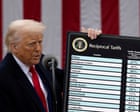
In a rapidly shifting global landscape, recent developments in international trade policies and economic alliances have commanded attention. At the forefront is a potential increase in tariffs between the United States and Europe, alongside pivotal meetings among the BRICS nations—Brazil, Russia, India, China, and South Africa—where leaders aim to assert influence and unity amidst absent key figures.
During talks in Washington, former U.S. President Donald Trump unveiled a potential policy shift, threatening to impose a 17% tariff on food and farm produce from Europe. This trade measure, if enacted, could affect a variety of beloved imports ranging from Belgian chocolates to Italian olive oil, impacting both European exporters and American consumers. While some express concern over a burgeoning trade war, the European Union maintains a preference for negotiation to reach mutually beneficial outcomes. In preparing for possible retaliatory measures, EU states remain cautiously optimistic that dialogue will prevail over discord.
Meanwhile, the BRICS nations are working to advance their common economic interests against a backdrop of dynamic global economic policies. Notably, the upcoming summit is set against the scenic Guanabara Bay, yet the absence of Chinese President Xi Jinping and Russian President Vladimir Putin casts a shadow over the event’s political impact. These gatherings traditionally focus on fostering emerging economies, yet the internal challenges of harmonizing individual national ambitions with collective goals persist.
In another economic shift, credit reporting practices in the U.S. are set to embrace changes that could transform the ‘buy now, pay later’ (BNPL) market. The decision to include BNPL loans in credit scoring adds a new layer of transparency and accountability for consumers who have grown accustomed to using these services for their flexible payment options. While this adjustment raises apprehensions for users wary of potential limitations on their financial activities, experts suggest it could ultimately lead to a healthier credit landscape, encouraging responsible borrowing habits.
Simultaneously, in European political dialogues, the current climate of immigration policies continues to stir debate. Statements from political leaders in countries such as Portugal highlight contrasting views on national policy effectiveness and its impact on societal development. Critique of what is perceived as ‘irresponsible’ immigration governance sparks important conversations on finding balanced approaches to these complex challenges.
In reflecting upon these broad global conversations, there emerges a shared theme of interconnectedness and the necessity for cooperation across borders. Whether through negotiating trade terms, strengthening international alliances, or ensuring fair financial practices, the path forward invites thoughtful, inclusive approaches to navigating the intricacies of our collective future.
Source: {link}
